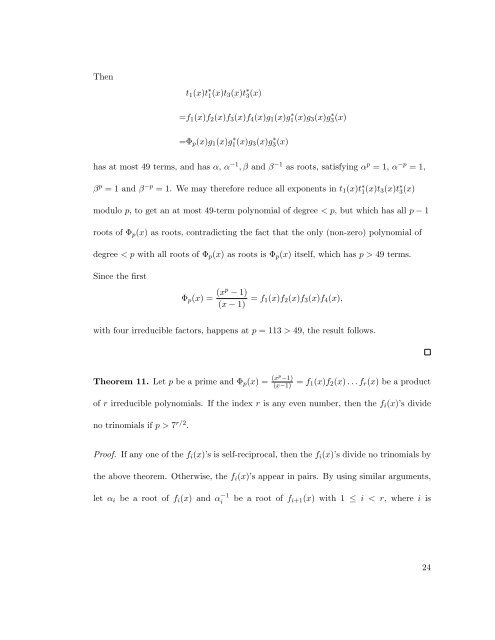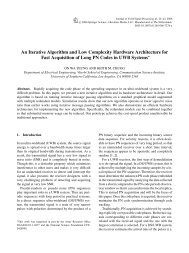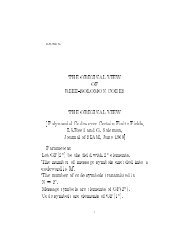Irreducible Polynomials Which Divide Trinomials Over GF(2). - The ...
Irreducible Polynomials Which Divide Trinomials Over GF(2). - The ...
Irreducible Polynomials Which Divide Trinomials Over GF(2). - The ...
- No tags were found...
Create successful ePaper yourself
Turn your PDF publications into a flip-book with our unique Google optimized e-Paper software.
<strong>The</strong>nt 1 (x)t ∗ 1(x)t 3 (x)t ∗ 3(x)=f 1 (x)f 2 (x)f 3 (x)f 4 (x)g 1 (x)g ∗ 1(x)g 3 (x)g ∗ 3(x)=Φ p (x)g 1 (x)g ∗ 1(x)g 3 (x)g ∗ 3(x)has at most 49 terms, and has α, α −1 , β and β −1 as roots, satisfying α p = 1, α −p = 1,β p = 1 and β −p = 1. We may therefore reduce all exponents in t 1 (x)t ∗ 1 (x)t 3(x)t ∗ 3 (x)modulo p, to get an at most 49-term polynomial of degree < p, but which has all p − 1roots of Φ p (x) as roots, contradicting the fact that the only (non-zero) polynomial ofdegree < p with all roots of Φ p (x) as roots is Φ p (x) itself, which has p > 49 terms.Since the firstΦ p (x) = (xp − 1)(x − 1) = f 1(x)f 2 (x)f 3 (x)f 4 (x),with four irreducible factors, happens at p = 113 > 49, the result follows.<strong>The</strong>orem 11. Let p be a prime and Φ p (x) = (xp −1)(x−1)= f 1(x)f 2 (x) . . . f r (x) be a productof r irreducible polynomials. If the index r is any even number, then the f i (x)’s divideno trinomials if p > 7 r/2 .Proof. If any one of the f i (x)’s is self-reciprocal, then the f i (x)’s divide no trinomials bythe above theorem. Otherwise, the f i (x)’s appear in pairs. By using similar arguments,let α i be a root of f i (x) and α −1ibe a root of f i+1 (x) with 1 ≤ i < r, where i is24









